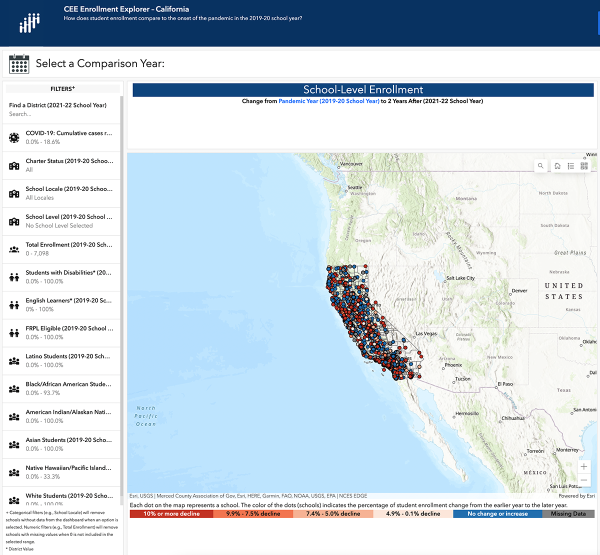COVID-19 and Equity in Education: Longitudinal Deep Dive
The COVID-19 and Equity in Education: Longitudinal Deep Dive project is creating an in-depth view of how states, districts, and their communities—especially those with higher percentages of Black and Latino students and/or students experiencing poverty—responded to the pandemic.
One component of the project is a longitudinal database containing state, district, school, and community data, enabling a broad view of pre-, during, and post-pandemic onset trends. The project is establishing community partnerships to provide deeper insights into the responses to the pandemic, aiming to support the field in understanding pandemic-related disruptions and to provide the foundation for research on how to support student learning in this context. The project focuses on six states: California, Florida, New York, Tennessee, Texas, and Washington.
The CEE Enrollment Explorer
The CEE Enrollment Explorer provides enrollment trends about how states, districts, and communities—especially those with high percentages of students who are Black, Latino or experience poverty—responded to the COVID-19 pandemic. A deeper dive into six states—California, Florida, New York, Tennessee, Texas, and Washington—reveals key information about changing enrollment patterns. All six states experienced an overall decline in public school student enrollment since the pandemic onset.
The Project's Two-fold Purpose


Contribute to a field of study focusing on community responses to the pandemic.

Support communities and researchers in examining and implementing strategies to improve equity in K–12 education.
Announcements & Additional Resources
From the NYU Steinhardt School of Culture, Education, and Human Development's blog:
- Introducing the Indicators of Education Equity Project
- Access to Advanced Coursework in NYC High Schools
- How Equitable is Access to a Positive School Climate in NYC Schools?
Read the brief Examining Heterogeneities in Public School Enrollment Trends During the Pandemic: Evidence from Four States (October 2021, PDF), which explores differences in enrollment trends in California, Florida, Texas, and Washington during the COVID-19 pandemic
Why This Project?
The project offers communities, researchers, and education stakeholders nationwide the opportunity to analyze, understand, and act on critical questions about community and education system responses to the pandemic.
The project supports key stakeholders in communities and education systems to use data and research to improve outcomes for students, with a focus on the trajectories of Black and Latino students and/or students experiencing poverty.
Research Questions
- How has the pandemic shaped education systems and how they interact with other systems (e.g., health, economic, social support); and how has it affected the experiences and outcomes of students and families in the short and long term?
- How do responses to the pandemic vary across communities?
- How can research driven by community-determined priorities support improvements in educational equity during the post-pandemic period?
Project Approach
Create a COVID-19 and K–12 education and community longitudinal database: A public dashboard that helps examine education, health, economy, social vulnerability, and employment indicators from 2016 to 2023.
Engage and support community teams through a research-practice partnership network to identify critical areas of need and drive a research agenda that contributes to the community and pandemic recovery.
Conduct community and stakeholder-specific ethnographic stories that document their experiences during the pandemic and recovery period.
Establish a community for Black and Latino researchers who will use the data to build a body of work and lead an emerging field of study focusing on the trajectories of Black and Latino students and/or students experiencing poverty during the pandemic and recovery period.
